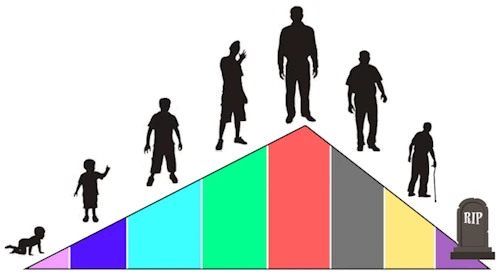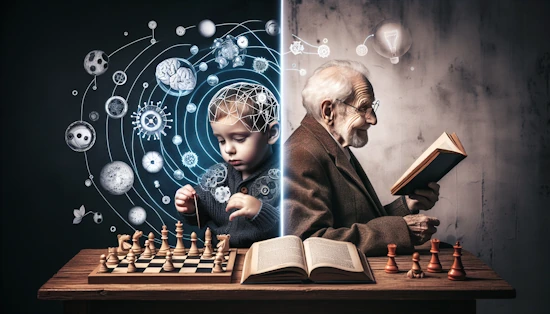
Introduction
Do you ever find yourself feeling older or younger than your chronological age? Have you encountered a child who seems wise beyond their years, or maybe an adult who maintains a youthful spirit despite their gray hairs? This fascinating disparity between physical and psychological age is not a mere illusion; it’s a recognized theoretical construct known as “mental age“. This idea has significant implications for our overall psychophysical balance, influencing how we perceive ourselves and interact with the world around us.
What Is Mental Age?
Mental age is a metric utilized in psychological evaluations to convey a person’s level of mental development or maturity, based on the number of years it typically takes for an average person to reach that same level. This concept goes beyond simply counting the number of years one has been alive; it delves deeper into the individual’s mental and emotional growth and maturity.
By examining mental age, we can gain valuable insights into how our cognitive abilities, life experiences, and emotional intelligence shape our identities, and ultimately, our relationships with others. Understanding this differentiation can help us appreciate the diverse ways in which people navigate through life, regardless of their chronological age.
Mental Age versus Chronological Age
The concept of chronological age is straightforward: it refers to the number of years an individual has been alive since their birth. However, the concept of mental age is more complex and subjective. It is indicative of an individual’s cognitive abilities, emotional maturity, and level of wisdom. In contrast to chronological age, mental age is not a fixed quantity and can vary depending on an individual’s experiences, surroundings, and mindset.
The Science Behind Mental Age
The concept of mental age is not solely determined by chronological age. Rather, it is a state of mind, as evidenced by numerous research studies. For example, the renowned Atchley’s Ohio Longitudinal Study of Aging and Retirement demonstrated that a positive perspective on aging could, on average, add 7.6 years to one’s life.
In the 1980s, an experiment was conducted on elderly individuals who were transported to an environment that simulated their youth. The study demonstrated that the subjects exhibited remarkable improvements in their physical and cognitive abilities. The participants were instructed to fully immerse themselves in their younger selves, which resulted in notable changes in their posture, dexterity, and overall physical appearance. It is noteworthy that even their vision demonstrated enhancement as a consequence of this immersive experience.
The Impact of Mental Age on Health and Wellbeing
Our self-perception can have a profound effect on our overall health and welfare. According to a research conducted by psychologist Becca Levy at Yale University, older individuals who hold negative beliefs about aging tend to experience more notable decline in their hearing abilities over a three-year period compared to those who have a more optimistic perspective.
A pivotal study conducted by the University of Exeter Medical School demonstrated that older individuals who perceived themselves as physically weak were less inclined to engage in physical activities, which ultimately increased their risk of developing frailty. In essence, our physical condition is influenced by our mental perceptions.
Keeping a Young Mind: The Role of New Experiences
The incorporation of novel experiences may prove to be a pivotal factor in maintaining a youthful mentality. Research has demonstrated a significant correlation between the presence of a sense of purpose and overall health and happiness in our later years. Participating in unfamiliar activities, acquiring new abilities, and pursuing fresh challenges can help to maintain a youthful mentality and physical vitality.
Travel: The Elixir of Youth
One of the most powerful methods to maintain a youthful mental age is through traveling. This activity entails embracing novel experiences, acquiring new skills, and conquering obstacles. It is a dynamic engagement that stimulates our minds, keeps us mentally agile, and fosters a youthful perspective.
How Perception Shapes Reality: The Story of Eight Elderly Men
A radical experiment conducted in 1981 provides an illustrative example of how our mental age can influence our physical state. Eight elderly men were transported to a converted monastery designed to conjure up the year 1959. Following a five-day immersion in this temporal environment, the subjects exhibited enhanced physical and mental capabilities, thereby underscoring the profound influence of mindset on our corporeal reality.

The Impact of Life Experiences on Mental Age
Our mental age can be greatly affected by life experiences, especially those that are difficult. Traumatic occurrences, responsibilities, and difficult situations may lead to a quicker mental maturation compared to others. For instance, a child who experiences the loss of a parent at a young age may develop a mental maturity that surpasses their peers.
The Role of Humor in Mental Age
The perception of one’s age can be significantly influenced by the possession of a sense of humor. The ability to maintain a positive outlook and to recognize the humor in the absurdities of life can result in the perception of being younger than one’s actual age. Humor serves as a protective mechanism against the harsh realities of life, allowing individuals to maintain a youthful mindset.
Mental Age and Neurological Conditions
Certain neurological conditions or cognitive impairments can also affect a person’s mental age. For instance, a person with severe autism might have the mental age of a child despite being an adult chronologically. Such scenarios underscore the importance of approaching mental age with empathy and understanding, recognizing its complex and multifaceted nature.
Conclusion
When considering everything, age may simply be a perspective. Our mental maturity, influenced by our past, mindset, and outlook, can greatly influence our well-being, quality of life, and overall health. Consequently, when celebrating one’s birthday, it is important to recognize that one’s mental maturity is of equal, if not greater, significance than the number of candles on the cake.
So, how do you measure your mental age? For example, by taking our unique mental age test, which is both fun and sharp.
If you are under 16, we also recommend you to try the Youth Wisdom Test to check your maturity level.
TAKE THE MENTAL AGE TEST
TAKE THE YOUTH WISDOM TEST
MINI-TEST: ARE YOU YOUNG OR OLD MINDED?
Are you on the hunt for a quick and free mental age test? We’ve got just the thing for you! This is a shorter, simpler version of our Mental Age Test with AI. If you want a full picture of your mindset, we suggest you take the full test right after trying this mini-quiz. Below, you’ll find five questions and three different profiles (Child, Adult, Elderly), each one matching a specific mental state. So, which mental group do you think you belong to?
Answer all the questions and select one answer for each question.
1. How important is fun for you?
2. Does the idea of getting old scare you?
3. Do you trust what you see on television?
4. In which context would you prefer to live?
5. Arrange the following in order of importance:
Count how many times you have selected each letter:
C = Child
A = Adult
E = Elderly
The category with the highest score indicates the predominant type of mindset:
If C > A & E: You have the mental age of a CHILD
If A > C & E: You have the mental age of an ADULT
If E > C & A: You have the mental age of an ELDERLY
